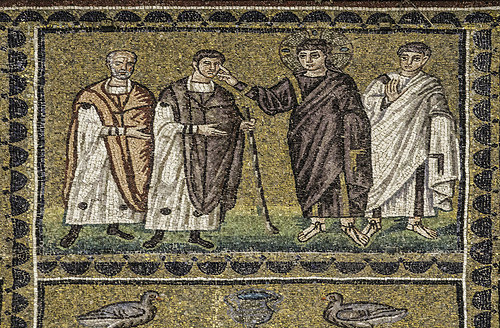We run our website the way we wished the whole internet worked: we provide high quality original content with no ads. We are funded solely by your direct support. Please consider supporting this project.

Does God Still Heal?
In the ancient world Jesus was known first and foremost as an exorcist and a healer. These two activities are mentioned in every summary of Jesus’s ministry found in the Gospels.
It’s common for Western Christians today to accept that infirmities (sickness, disease, injuries, disabilities and deformities) are part of God’s mysterious plan for their life. We may ask God to relieve us and others from physical afflictions, but we also pray for God to help us accept them as part of his mysterious “sovereign plan.”
Jesus and the early church had a different perspective, however. Never once did Jesus or anyone else in the New Testament encourage people to accept their afflictions as coming from God. Instead, they uniformly revolted against afflictions as being the direct or indirect byproducts of Satan’s oppressive regime. They viewed sickness and disease as part of the diabolic curse that afflicts the fallen world and they understood that the kingdom of God is all about reversing the curse. They believed that where God reigns, his original holistic design for the human body would be restored and the physical afflictions that were directly or indirectly brought about by the demonic powers would cease.
For example, Luke describes a woman who was “bent over and could not straighten up at all” as being “crippled by spirit.” When Jesus healed the woman certain religious authorities objected, for it was the Sabbath. But Jesus replied, “should not this woman, a daughter of Abraham, whom Satan has kept down for 18 long years, be set free on the Sabbath day from what bound her?” (Luke 13:11, 16). The woman’s deformed back was the result of a crippling spirit and part of Satan’s oppressive regime.
The central role healing played in Jesus’s ministry as well as the close connection between physical infirmities and demonic activity is succinctly expressed by Peter when he summarizes Jesus’s ministry by saying, “he went around doing good and healing all who were under the power of the devil” (Acts 10:38). Jesus was all about reversing the curse, and this included all forms of physical affliction.
This was the general understanding of the church for the first three centuries. In fact, the early church’s ability to free people from physical afflictions and demonic oppression was one of the strongest tools of evangelism. While healers and exorcists were rather common in the ancient world, it was widely conceded that no one could heal or deliver people as effectively and as consistently as Christians.
Since the job of the church is to manifest everything Jesus manifested and revolt against everything Jesus revolted against, we must accept that manifesting God’s original holistic design for the human body while revolting against the powers that afflict us physically remains a central part of our kingdom mandate. We are called to revolt against physical infirmities as part of Satan’s regime, not accept them as part of God’s mysterious will.
We are called to trust that God can and does continue to heal people today.
Image by Lawrence OP via Flickr
Category: Q&A
Tags: Faith, healing, Sickness, Spiritual Warfare, Warfare Worldview
Topics: Faith & Doubt, The Problem of Evil
Related Reading

Ralph D. Winter Lectureship
Greg has been invited to give this year’s lectures for “The Ralph D. Winter Lectureship,” this April 25 and 26. Greg’s lectures will be on the Biblical Warfare Worldview and its implications for understanding evil, especially “natural” evil and for our understanding of the Christian Life and missions. Greg will also join a panel of…

So Much Evil. Why?
In light of the profound evil being experienced by the people of Paris and countless other locations around the world, we thought we would raise again the question that many ask when things like this occur: Why? Of course, Greg has spent much of his writing and speaking energy addressing this. Here is a basic,…

The Universal Experience of the “Spiritual”
Humans have from prehistoric times generally assumed the reality of spirits who transcend our physical existence. Outside of post-Enlightenment western intellectual culture the belief in spirits is almost universal. Whether conceptualized as spirits of nature or as power animals (as in primordial cultures), as helpful malã’ika or malicious Jinn (Islam) or as guardian angels or…

Spiritual Warfare: What is it?
The Kingdom is “not of this world,” and neither is its warfare. Jews had always believed that God confronted spiritual opposition in carrying out his will on earth. In the Old Testament, these evil forces were usually depicted as cosmic monsters and hostile waters that threatened the earth. For a variety of reasons this belief…

Lord Willing?
Lord Willing? Wrestling with God’s Role in My Child’s Death, by Jessica Kelley In November 2012, I received one of the most touching emails I have ever received. A young mother named Jessica Kelley explained to me that her four-year-old son had been diagnosed with an aggressive brain tumor. Despite his parents’ and doctors’ valiant…

Rethinking Our View of Faith
The second conviction of the “ReKnew Manifesto” is that we need to rethink what it means to have faith. It’s my impression that many, if not most, Evangelical Christians associate their assurance that they’re “saved” with their confidence that they believe correct doctrines. This is why many, if not most, think that heretics who believe…
